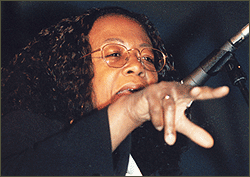Choice Module
Living in a Europe of many Religions
Interreligious Dialogue as a Contribution to a Culture of Peace in Europe.
An Introduction
to the Dialogue Method.

Goals and Background
The European constitution makes it clear that European societies are secular.
Still the memory of the traditional self-understanding of Europe as a Christian
continent lingers on, obscuring both the secular character of modernity
and the fact that Islam and Judaism are part of European tradition.
In Europe’s history religion has played a major role, both as a source of
conflicts, and as inspiration for struggles for greater freedom, human dignity
and emancipation and secularism which in itself might be called a product
of Christianity.
While most countries of Europe practise a separation of state and church/religious institutions, religion continues to be a source of identity for many people, influencing the formation of values, deeply held convictions and lifestyles. This shows particularly in the interaction between majority Christian/secular societies and the growing communities of Muslims in many European countries. The optional module will therefore focus on these.
Most Muslims came as migrant workers or asylum seekers from the Balkans,
the Middle East, the Maghreb or Asian countries. They have created their
own communities, seek to practise their culture along with their faith and
grapple with life in modern, secular societies.
Life together is not without problems and tensions: There is a lot of unease
among Christians and secular people, who are afraid that Muslims could use
the ample democratic and constitutional rights, to further “their own purposes“.
Muslims, on the other hand complain that there is a tendency to suspect
all Muslims of being fundamentalist and unwilling to acknowledge the secular
societies of which they are part. Such suspicions surface not only around
terrorist attacks, but also around everyday issues such as the “scarf debate“,
questions of women’s rights, food (slaughtering), and on other issues of
religion and culture.
The module aims to
• Create some basic mutual understanding of the two religions, Islam and
Christianity as “systems of being in the world“
• Create comprehension of what “religious freedom“ in a secular context
might mean
• Build awareness that Islam too has played a historical role in Europe
• Explore the potential of religion to build an everyday culture of social
harmony in Europe and the role of women in this process.
Content
• The place of religion in European societies: religion, secularism,
the role of the state
• Islam and secularism
• The contribution of religion to everyday culture and a system of values
and meaning, looking at personal roots
• Ways of acknowledging and dealing with difference in a life-enhancing
way – “living diversity“: the dialogue method
• Some typical problems arising between majority and minority groups
Throughout women will be the entry point, identifying areas of concern and of action.
Methodology
The approach will follow on the one hand the dialogue method developed by the MIT/Cambridge, Mass. dialogue project (David Bohm, Bill Isaacs, adapted by Johannes and Martina Hartkemeyer) and on the other hand a methodology, developed by the European Project for Interreligious Learning (EPIL), which combines the MIT dialogue method with creative and cognitive forms of learning and adapts it to interreligious dialogue. The module will include dialogue exercises, lectures, encounters with best practice examples, etc.
Leadership and Lecturers
The module is planned to be held in Switzerland as a co-operation between ewec and the European Project for Interreligious Learning (EPIL).
The core organising team would consist of the following
• Amira Hafner-Al Jabaji, educator, writer and Islamic scholar, lecturer
at the European Project for Interreligious Learning, co-founder of the Swiss
interreligious theology course
• Dr. Karen Smith, anthropologist and educator
• Dr. Reinhild Traitler-Espiritu, educator and theologian, coordinator of
the European Project for Interreligious Learning, co-founder of the Swiss
inter-religious theology course.
Among lecturers will be the following (to be invited):
• Dr. Martina Hartkemeyer, expert in dialogue training, O. Reichwein
Society, Osnabrück
• Dr. Gret Haller, former OSCE Ombudsperson for Human Rights, Bosnia
and Hercegovina, author of the book “Limits to Solidarity“
• Prof. Dr. Mercè Viladrich, professor of Islamic civilisation, Autonomous
University, Barcelona/Mercè Sala, M.A. historian, Barcelona
• Rabeya Müller, M. A. Center for Islamic Women’s Studies, ZIF-Koeln,
Cologne
• Marise Lendorff Al Raafi, M.A. Islamic studies in Teacher Training,
City of Zürich, Education Department
• Teny Pirri-Simonian, M. Sc., director, Office Church and Ecumenical
Relations, World Council of Churches, co-leader, European Project for Interreligious
Learning
Reading list
• General Background Reading on Dialogue and the Debate on Universal/Particular, State, Culture and Religion
• Martina Hartkemeyer, Johannes Hartkemeyer, Freeman Dhority, Miteinander Denken- das Geheimnis des Dialogs, Klett-Cotta, 2001
• W. Isaac, Dialogue and the Art of Thinking Together, Doubleday, New York 1999
• Gret Haller, Die Grenzen der Solidarität, Aufbruch Verlag, 2002, English abstract can be downloaded from www.grethaller.ch
• Reinhild Traitler, ed. In the Mirror Of Your Eyes, Report of the European Project for Interreligious Learning, Zürich and Beirut, 2004,
can be ordered from http://www.epil.ch
• Interreligious Insight, A Journal for Dialogue and Engagement, Vol. 2/No. 3 July 2004 (Special Issue, 2004 Parliament of Religions, see espec. J. Sacks and L. Swidler, “Towards a Dialogue of Civilizations”, pp. 35 – 46)
• Monica Ali: Brick Lane, Doubleday 2003, Black Swan Books 2004
Dossiers of documentation on each of the themes chosen for Day III of the module will be supplied separately.
Useful links (will be supplemented)
http://www.epil.ch
http://www.zif-koeln.de
http://www.grethaller.ch
> QUIZ